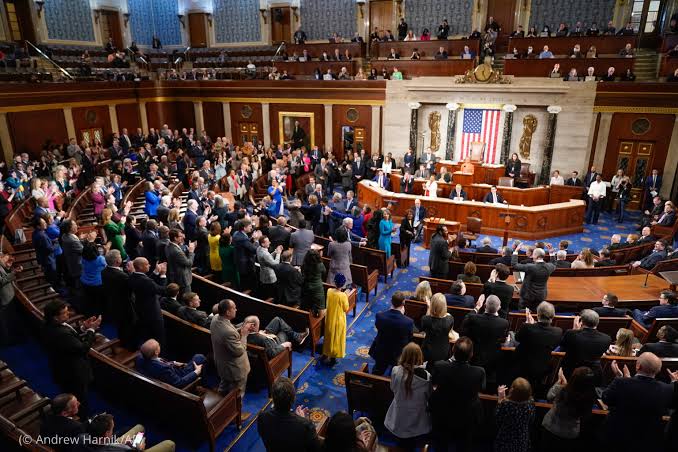
Samuel Omang
The United States Congress has opened a major inquiry into what it describes as widespread and systematic killings of Christians in Nigeria, following President Donald Trump’s recent redesignation of the country as a “Country of Particular Concern” (CPC) for religious freedom violations.
The open hearing, scheduled for Thursday, November 20, will be conducted by the House Subcommittee on Africa and chaired by Rep. Chris Smith (R-NJ). The session—set for 11 a.m. in Room 2172 of the Rayburn House Office Building—will feature two panels of senior U.S. officials and Nigerian religious leaders. It will be streamed live for global viewing.
If upheld by the U.S. Senate, the CPC designation would empower Washington to impose sanctions on Nigerian government officials found complicit in religious persecution, restrict bilateral assistance, and signal to the international community that Nigeria remains a hotspot for severe violations of religious freedom.
A congressional communication inviting members to the hearing confirmed that top officials including Jonathan Pratt, a Senior Bureau Official at the Bureau of African Affairs, and Jacob McGee, a Deputy Assistant Secretary in the Bureau of Democracy, Human Rights and Labor, will testify. A second panel will feature the Director of the Center for Religious Freedom, Nina Shea; Bishop Wilfred Anagbe of the Makurdi Catholic Diocese; and Oge Onubogu of the Center for Strategic & International Studies.
The hearing will explore the scale of religious persecution in Nigeria and consider possible U.S. responses—from targeted sanctions and humanitarian aid to closer collaboration with the Nigerian Government on preventing future violence.
Trump reignited global debate on October 31 when he announced Nigeria’s CPC redesignation, citing what he called “severe violations of religious freedom” and warning that the U.S. might take decisive action—including military intervention—if the Nigerian Government failed to halt killings targeting Christian communities. He accused “radical Islamists” of perpetrating what he termed an existential threat to Christianity in Nigeria.
“If the Nigerian Government continues to allow the killing of Christians, the USA will immediately stop all aid and assistance… and may very well go into that now-disgraced country, ‘guns-a-blazing,’ to completely wipe out the Islamic terrorists,” Trump said.
Faulty Data or Real Grievance? FG, US Lawmakers Clash Over ‘Christian Genocide’ Claims
President Bola Tinubu swiftly rejected the claim, describing the U.S. President’s statements as a misrepresentation of Nigeria’s religious reality. Tinubu insisted that Nigeria remains committed to religious liberty under its constitution and that the nation is not defined by intolerance or persecution.
“Religious freedom and tolerance have been a core tenet of our collective identity,” Tinubu said on his official X account.
The issue has gained renewed global attention amid repeated attacks on Christian communities across Nigeria by extremist groups and armed militias. Bishop Anagbe—who will testify before the U.S. Congress—had earlier briefed British lawmakers on what he described as coordinated attacks on Christian communities in Benue State by Islamist extremists and militant herdsmen.
He narrated how churches were torched, farmers driven from their land, and priests and worshippers killed. His accounts contributed significantly to the growing international pressure.
U.S. Congressman Riley Moore (R-WV), speaking on Fox News on Sunday, insisted that the allegations against Nigeria were credible and substantial. He cited blasphemy laws in some northern states and ongoing cases where individuals face capital punishment over religious disputes.
“There is serious persecution happening in Nigeria,” Moore said, dismissing Tinubu’s counterclaims as “completely false.”
He argued that available data suggested a disproportionate death toll, claiming that Christians were being killed at a ratio of “five to one” compared to Muslims and other groups.
Moore also defended U.S. involvement, saying America had a moral responsibility to intervene where religious freedom is under threat. He noted that the CPC designation grants Trump wide-ranging powers—including sanctions and potential military action.
However, Congressman Bill Huizenga sought to downplay fears of imminent armed intervention, telling Arise TV that while Trump’s words were forceful, a military strike was unlikely. Instead, he predicted sanctions and economic pressure as more realistic tools to deter extremist groups.
Meanwhile, Pope Leo XIV added his voice to the growing concerns, lamenting persecution of Christians in Nigeria, Mozambique, Sudan, Bangladesh, and other regions. He prayed for the victims of ongoing violence in Kivu, DR Congo, urging believers worldwide to work for peace.
In Nigeria, the Federal Government continued its peace outreach efforts. Last Thursday, President Tinubu dispatched Dr Abiodun Essiet, his Senior Special Assistant on Community Engagement for the North Central Zone, to Plateau State. Essiet held separate meetings with Christian leaders, the Miyetti Allah group, and youth organisations in an effort to defuse lingering tensions.
One long-running dispute in Gyel district of Jos South—between farmer David Toma and local herdsmen—was resolved after the Miyetti Allah chairman in Bassa LGA paid N500,000 in compensation for damage to Toma’s farm. Both parties signed an undertaking to maintain peace.
As Congress prepares for Thursday’s hearing, Nigeria faces renewed international scrutiny, with the possibility of sanctions and diplomatic consequences looming over the Tinubu administration.
.
